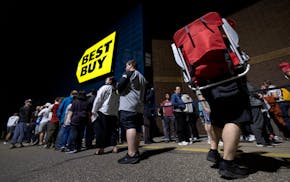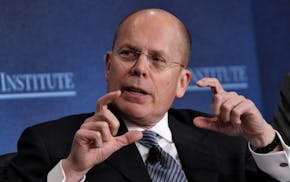Patients are reporting difficulties accessing the anti-COVID drug Paxlovid this winter, even as the coronavirus causing the infectious disease reaches levels not seen in months.
Angela Carpio couldn't convince an urgent-care provider to prescribe the antiviral pills for her 63-year-old mother-in-law, and ended up taking her home with only cough syrup.
"My mother-in-law deeply regrets not taking the prescription. She's been really sick," said the Robbinsdale woman. "Her chest was tight. She was been coughing nonstop."
Paxlovid was in high demand when Pfizer made it broadly available during the delta and omicron pandemic waves of COVID-19 in 2022, but payment issues and occasional shortages at pharmacies have made it harder to acquire. Carpio recalled that she got it delivered for free to her house in one hour in early 2023 after she got COVID and informed a doctor online that she was at elevated risk for complications because of her asthma.
"It was amazing for me," she said.
Access has always been a concern because the effectiveness of Paxlovid is time-sensitive. The drug inhibits an enzyme in the body that the coronavirus needs in order to spread and infect other cells. But studies found that people need to start taking the three-dose regimen within five days of symptom onset in order to prevent COVID-19 from becoming severe.
A study at VA Boston Health Care found last year that about 1 in 5 COVID-19 patients at high risk for complications didn't receive Paxlovid because they already had symptoms for too long. But an equivalent amount of patients simply weren't offered the drug by their caregivers, said Dr. Paul Monach, a leader of the research.
That problem could be getting worse outside the veterans health system, because some doctors in the post-pandemic era don't like how Paxlovid counteracts other prescriptions their patients are taking, and don't want to deal with billing hassles now that the $1,000-or-so cost of the drug regiment is transitioning away from the federal government and toward insurance companies and individuals.
Monach said there might be a temptation to leave mild cases untreated, but "high-risk patients with mild symptoms are exactly who should be offered treatment, rather than using it as a reason to not offer it."
Who needs Paxlovid is a matter of some dispute. The CDC encourages treatment of COVID-19 for anyone over 50, but especially people over 65. Monach said some doctors consider people at age 60 to be at high risk, but others set the age cutoff higher.
Doctors also have become more selective in prescribing because of recent research, said Dr. Laurel Ries, president of the Minnesota Medical Association and a family practitioner in St. Paul. A report last summer in the New England Journal of Medicine compared COVID outcomes among patients at low risk of complications, and found that those who took Paxlovid didn't get better much faster than those who took nonmedicating placebo pills.
"We don't need to prescribe medicines that do nothing" for people at lower risk of complications, Ries said. "That's not where we want to go with medicine."
Carpio took her mother-in-law on Dec. 31 to a Park Nicollet urgent care clinic in St. Louis Park. The clinic is affiliated with HealthPartners, which has maintained an aggressive standing prescription order by which patients screened at high risk of COVID complications can receive Paxlovid prescriptions without even seeing doctors.
Carpio said her mother-in-law feel wasn't deemed at high risk during her visit, despite being 63 and taking a high-dose cholesterol medication. The doctor was concerned about how Paxlovid would disrupt that medication and adamant that the family wouldn't receive financial coverage for the drug.
Carpio said the dispute felt "uncomfortable," especially considering her mother-in-law's boyfriend had gone to the same urgent care one day earlier and received a Paxlovid prescription from another provider, despite being the same age. He followed medical guidance and stopped taking his cholesterol medication until he completed his course of Paxlovid.
His problem came at the next step when a pharmacy worker convinced him that he would have to pay the full cost himself. Carpio took him to a different pharmacy the next day to clear up confusion over his insurance status.
She doubts others have the time to fight. "When you have a bunch of people who are sick, and they're being told, 'You're not going to be able to afford it,' they're not going to get that care."
COVID-19 hasn't appeared as severe in Minnesota in recent months. Hospitalizations related to the infectious disease are only half what they were at this time last winter, even though viral levels detected in wastewater sampling have increased over the past month. However, COVID has combined with rising rates of influenza and other viruses to clog emergency rooms this month. Doctors said it is imperative to reduce preventable illnesses and hospitalizations.
Financial support options changed at the start of the year, but Pfizer said in a statement that full coverage of Paxlovid for people on Medicare was extended through February. People who are uninsured or underinsured also can apply for help if they meet income guidelines and can't afford their copays. Privately insured individuals also can apply for up to $1,500 in support or rebates to offset their out-of-pocket costs.
The Minnesota Department of Human Services also said in a statement that it continues to fully cover Paxlovid for low-income individuals on Medical Assistance, and to pay for the drug minus a $25 copay for people on MinnesotaCare.
Carpio said Paxlovid appeared to work for her mother-in-law's boyfriend, and the prescription was covered. Her mother-in-law struggled for another week and went to her regular doctor, who discovered that she also had RSV and a sinus infection. The doctor prescribed antibiotics, which eventually helped, but then asked her patient a question: Why hadn't she sought Paxlovid?

UnitedHealth sues the Guardian, alleging defamation in coverage of nursing home care

Prices for international flights drop as major airlines navigate choppy economic climate
Minnesota's med spa industry rises in popularity — and with little regulation

Hundreds line up at Best Buy to nab Nintendo Switch 2, in scene like '90s opening parties

